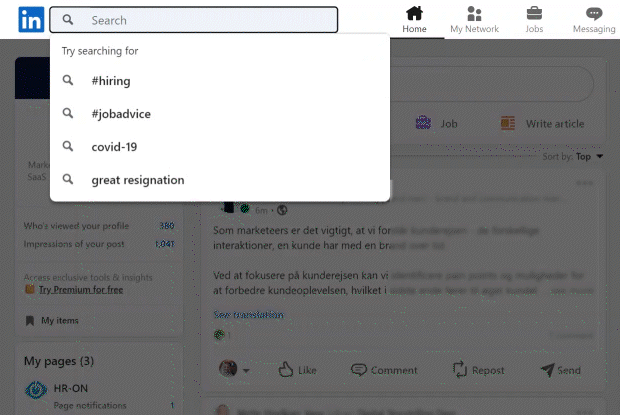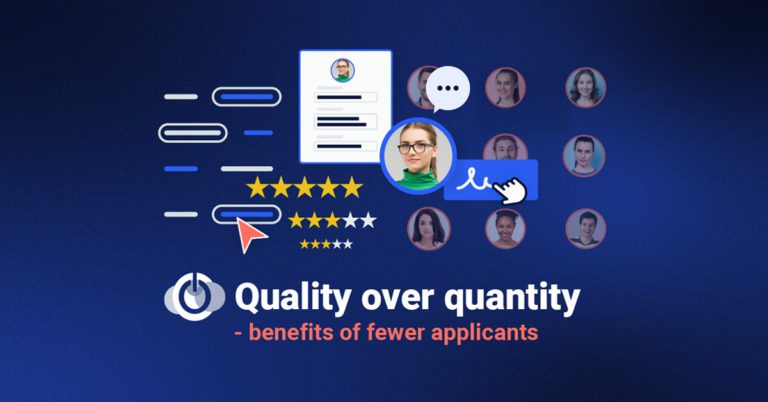Quality Over Quantity: Why Are Fewer Applicants Better Than Many?
Are you frustrated that you aren’t getting enough applications for your vacancy? Perhaps, you expected a bunch of applications and a long queue of applicants who all wanted the job?
There can be many reasons why you haven’t received the number of applications that you’d hoped for. But fewer applicants don’t equal a bad vacancy. Receiving fewer applications may actually be better than receiving stacks.
Unless you’re hiring for huge events such as festivals or concerts, you typically only need one candidate. Therefore, even if the dream is to be swimming in applications, 5-10 candidates may be all you need.
How Do You Choose the Right Candidate When You Only Have a Few?
Firstly, you need to change your mindset: it’s not about the sheer number of applications, but it’s about the quality of the applications you receive.
Secondly, don’t panic if the the number of applications is low. You’re not competing with departments or other companies about who will receive the highest amount of applicants, rather, put your focus on finding the right candidate.
Finding that perfect match is much more important and should take up much more time. When done right, you end up hiring someone just perfect for the vacancy, and for your team.
Is Your Company Attractive to Applicants?
You can’t forget the importance of employer branding when looking for candidates. If you repeatedly find yourself lacking applications, you may want to take a look at your company’s employer branding.
You don’t need to be a huge cooperation like Google or Capital One to establish a good employer branding strategy.
For instance, one place to start is social media. Create a company profile and share your daily work life. Try to tell some employee stories or introduce the different company departments: Applicants a curious and want to know what the company culture is like. You can be one step ahead with a social media account, and through images or videos, work on your employer branding.
Is the Vacancy Wide or Narrow?
Keep in mind that the type of vacancy will affect the number of applicants. Some vacancies will appeal to a wide audience, while others will appeal to a smaller and more specific audience.
Do you want to know whether your vacancy speaks to a wide or narrow audience? Use LinkedIn’s search box: enter the specific job title, press ‘search,’ select ‘people’ and ‘location.’ Doing so enables you to get a rough estimate of the popularity of the specific job. It makes a difference whether you are looking for an educator or a PHP developer.

Hire With a Focus on Growth
When you have a few candidates with the right skills, you can choose to focus on the personal aspect and the candidates’ ability to grow professionally.
In many situations, candidates come to you for a reason. It is extremely rare for candidates to apply for positions that they don’t think they can fill. Candidates don’t necessarily need to have work experience for your specific vacancy – if they have curiosity, passion, and motivation for the job, it matters as well.
How do you find those candidates who can do the task without experience? Look for those who have accepted a challenge and grown with it. You can ask the following questions to explore their growth potential:
- Tell me about a situation where you went beyond what was expected of you.
- Have you taken on additional responsibilities outside your primary role?
- How do you feel when you know less about a subject than your closest colleagues?
- What do you do to stay up to date within your field?
- When will you be successful in your role?
Make Recruitment More Transparent With a Recruitment Platform
A recruitment platform like HR-ON Recruit can make the entire process more streamlined and transparent. With a consistent and faster recruitment process, you ensure that all candidates get an answer during the recruitment process. It is essential whether your candidate pool is large or small.
So the next time you see five applications ticking in, they’re all relevant. Fewer applicants give you time to review each individual candidate and provide those who didn’t get through a personal rejection.

